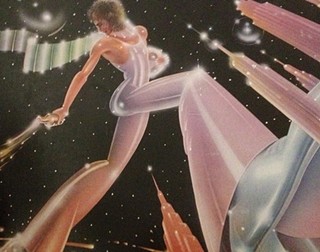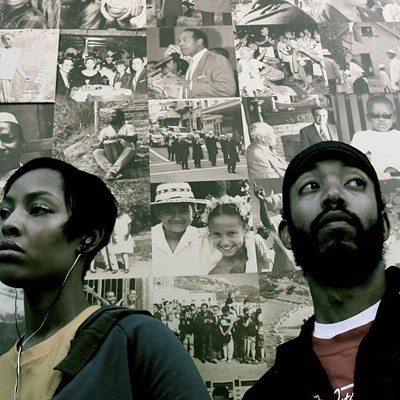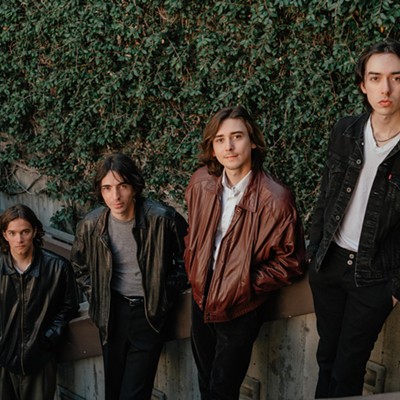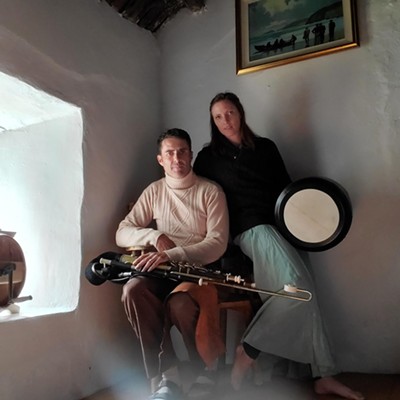These are the words of Eric Earley, singer/songwriter for Portland, Ore.'s Blitzen Trapper, and they reveal a couple of interesting things: The Pacific Northwest's cold, rainy climate creates a general ennui that helps explain its proliferation of bands; and there is a general modesty--to the point of undermining his own accomplishments--that shines through Earley's assessment.
Looking at the Pacific Northwest, it's not hard to see that its climate-related malaise may be responsible for its often paradoxical musical progeny. The region, known for the spiky, sludgy noise of bands like the Melvins and Nirvana, also birthed indie bands like Modest Mouse and Menomena--and all this after it fostered the fiery guitar freakouts of Jimi Hendrix.
In fact, Blitzen Trapper has spent this year in the midst of the Pacific Northwest's unusual musical paradox. This summer, Fleet Foxes released their eponymous debut--full of gorgeously soaked Beach Boy vocals wrapped in slight folk arrangements--on Sub Pop Records to appropriately clamoring praise, making them the year's "it" band. Meanwhile, Blitzen Trapper, who formed in 2000, just released their fourth album, Furr, also on Sub Pop, to positive if tempered reviews. After self-releasing three albums--including Wild Mountain Nation, the 2007 album that put them on the radar of Sub Pop and the music press--Blitzen Trapper have just managed to corral the kind of attention Fleet Foxes are already swimming in. As an interesting sidebar, when the two groups toured together earlier this year, Fleet Foxes opened for Blitzen Trapper.
Unlike the refined folk-rock harmonies of Fleet Foxes, Blitzen Trapper's music is rawer, stranger and more caustic. Speaking by phone from New York--where the band managed to swing by Late Night With Conan O'Brien for their national television debut--Earley was characteristically taciturn about the influence of the Pacific Northwest on the group.
"I would imagine it does (have an effect on the music), but I'm not an objective viewer, because I live there," Earley said. "I do think the region has an effect on the people who live there."
Earley, whose music sounds more conventional on first pass than it actually is, avoids an academic approach to his work, stating, "I think I have a more instinctual approach to making music." Instinct is fitting, as Furr is a shape-shifting album that swears allegiance to the ethos of classic folk rock without slipping into simple parody. Earley addressed Blitzen Trapper's necessary loyalty to its predecessors, such as Neil Young, the Grateful Dead and Bob Dylan.
"I think you have to be aware of the tradition of American music, and use it to make something unique and new, but at the same time, familiar," Earley said.
For all its classic roots, Furr starts with two songs reminiscent of a contemporary torchbearer: Wilco. There's the tooting, orchestral charge of opener "Sleepytime in the Western World," which sounds like a cut from Summerteeth, followed by the guitar blasts and washes of chimes, electronics and woodwinds that creep into (and close) rocker "Gold for Bread," which will strike a notable Yankee Hotel Foxtrot chord.
Yet, it's the lilting, folk strums of "Furr," a gorgeous werewolf/lost-youth song, that most eschews easy contemporary associations. The title track is a timeless harmonica and acoustic guitar number not unlike those of CSNY--that is, until the group peppers it with creepy forest sounds. "Furr" shows a band respectful of its antecedents, while anxious to experiment with the form. Furr, the album, also manages, with its stylistic integrity and focus, to make Wild Mountain Nation--with its moments of low-country beauty and cosmic strangeness--sound a bit overwrought.
Earley suggested that the extensive touring the group did helped inspire Furr.
"Touring is a big change of life," Earley said. "It changes the way you see things. ... It's fleeting and momentary."
Once again, Earley's modesty belies a serious work ethic. During the recording of Furr, Earley (who produced the record) opted to sleep in a telegraph building near the Willamette River where the group was recording.
"I think that had more to do with being broke," Earley said. "I was living there because I didn't have any money." Unsure, or perhaps undercutting his sincerity, Earley quickly second-guesses himself. "Maybe I did have money, and I was just being cheap, I don't know."
Certainly, the group's recent signing to Sub Pop has helped with any monetary woes. "It's been good," Earley admits. "I mean, they're giving us press. They're pretty hands-off as far as making records go, and they give us a bunch of support, like tour support."
If much of Furr sounds like studio trickery, audiences making the trek to Solar Culture can rest easy that Blitzen Trapper lose neither the immediacy nor the flourish of their recorded output live. "I think with (Furr), it's been really easy to (faithfully) perform the songs live," Earley said.
As far as preferences go, Earley cites the funky, Steely Dan-esque "Saturday Nite." "I get to do a phat keyboard solo," he said with a rare laugh. Then, with perfect dryness: "I was trying to write a Cat Stevens song, but it didn't quite turn out that way. I guess."











